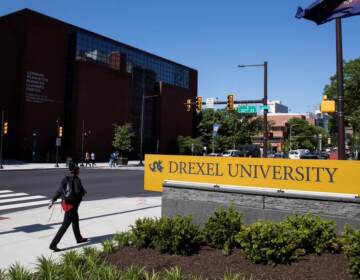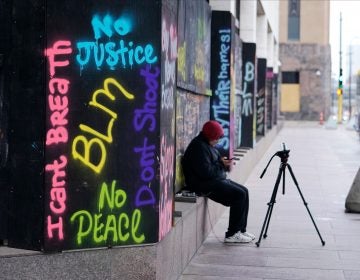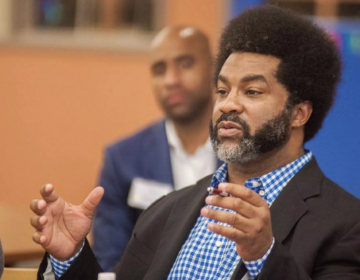Claiming solidarity isn’t enough. Drexel needs to act like Black Lives Matter
Campus activists challenge President John Fry’s commitment to racial justice based on his approach to community policing and development.
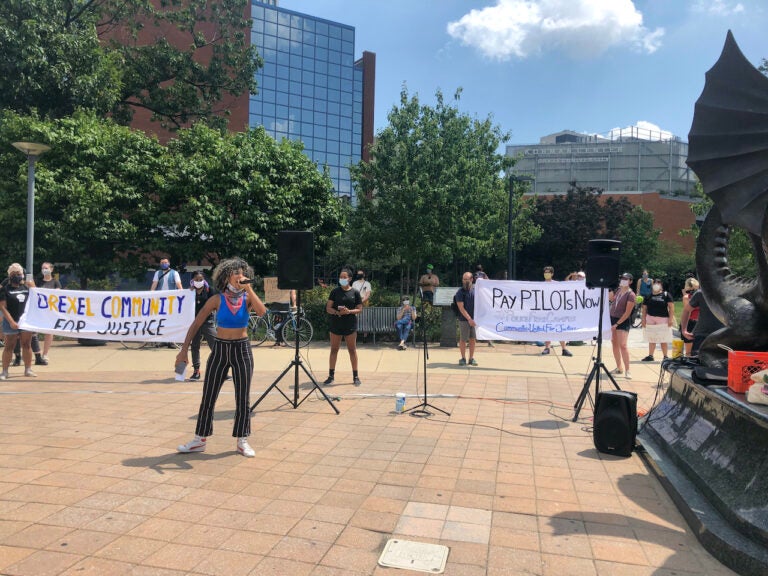
Samantha Rise from Girls Rock Philly addresses a crowd during a march on Aug. 9, 2020 in University City. (Courtesy of Penn Community for Justice)
This summer has been marred by relentless police violence. On May 25, 2020, George Floyd was murdered — in front of a nation — at the hands of four Minneapolis police officers. Many education leaders around the country soon issued statements to condemn this homicidal use of excessive force and the long, painful history of police brutality. Many also pledged to address their own institution’s historic and systemic racism.
At Drexel University, however, it took President John Fry over a week to issue a statement. During that week and a half, protests erupted all over the country and police violence against protesters was pervasive. In Philadelphia, city police shot tear gas, pepper spray, and rubber bullets at residents of West Philadelphia — aided by officers from Drexel and the University of Pennsylvania.
President Fry’s only pledge was to form a “task force” aimed at addressing racism on campus as well as an “independent review” of Drexel’s police department, conducted by 21CP Solutions, a pro-police consulting firm led by former Philadelphia Police commissioner, Charles Ramsey. This classic form of delay and deferral was a clear ploy to placate community members and dissuade activism on campus.
Listening sessions, town halls, task forces and working committees are created to obfuscate real pathways to change and distance decision makers, like Fry, from the community they serve. Inevitably, the university will publicly celebrate the small changes these “initiatives” create but President Fry’s communications make clear he is already committed to a vision for Drexel’s relationship with West Philadelphia.
During his tenure at the University of Pennsylvania, Fry led the West Philadelphia Initiatives with the goal of “revitalizing” the surrounding neighborhood. Fry worked to dramatically increase police presence and surveillance while investing in multimillion-dollar real estate developments in the area. His initiatives were associated with an almost 30% reduction in the number of Black residents in University City, according to research published in Urban Affairs Review, an academic journal.
Fry now continues to employ these same gentrification tactics at Drexel under the guise of “civic engagement.” In 2010, he committed “seven figures yearly” of Drexel’s budget to increasing police presence in Powelton and Mantua. He also created an incentive program for home-ownership to attract Drexel employees into the surrounding neighborhood, exacerbating gentrification.
Gentrification is inextricably linked to policing and violence against Black people.
Recent evidence suggests that Breonna Taylor’s murder, at the hands of Louisville Police, was connected to redevelopment efforts in the area. West Philadelphia’s trajectory is no different.
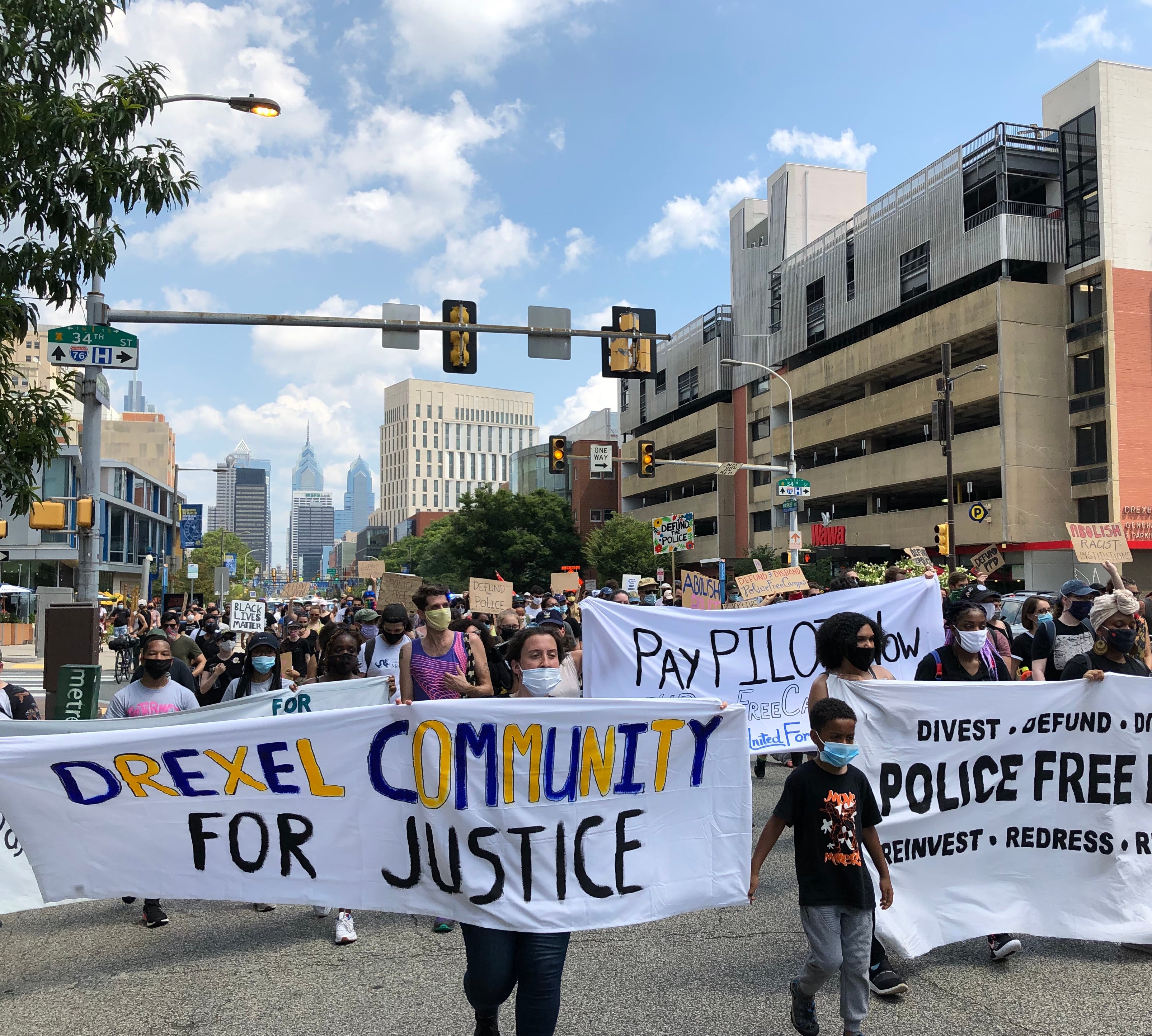
Petitions, demonstrations, and publications organized by campus activists continue to shed light on the hypocrisy of President Fry’s statements that claim Black lives matter at Drexel. And still activist efforts are met with silence.
Three days after the Kenosha police shot Jacob Blake seven times in the back, President Fry released another statement. “Police Shooting Renews Outrage Over Violence Against Blacks,” was the subject line. Three hours later he issued an apology regarding the use of the term “Blacks” instead of “Black Lives” or “Black people”.
Again, President Fry misses the mark.
His perception of ‘renewed outrage’ begs the question: Has he paid any attention to the Black Lives Matter movement or the multitude of voices calling for police divestment within the Drexel community and nationwide?
What will it take to get President Fry’s attention? A vote of no confidence from the faculty? A significant drop in alumni contributions? A decline in student applications? Even more activism by students? Given Fry’s response thus far, it looks like all of these actions should be pursued, and more.
___
Tianna Williams is a junior engineering technology student. She is President of Drexel’s Black Action Committee and Vice President of Drexel’s chapter of the National Society of Black Engineers. She sits as a Co-Chair of the Black Undergraduate Student Life sub-committee of the Anti-Racism Task Force.
Dylan Kaye is a second year medical student at Drexel University College of Medicine. He is on the leadership board of Drexel Community for Justice, an anti-racist, abolitionist organization.

Subscribe to PlanPhilly
WHYY is your source for fact-based, in-depth journalism and information. As a nonprofit organization, we rely on financial support from readers like you. Please give today.





